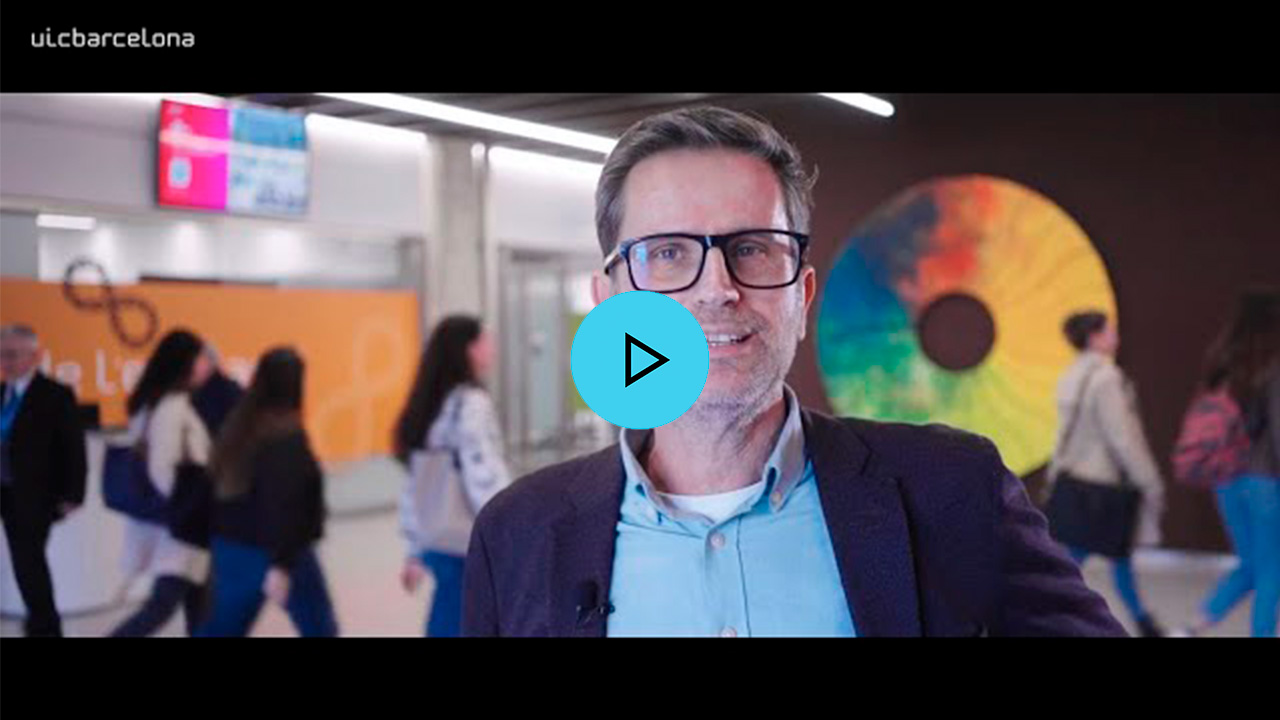Double Bachelor’s Degree in Pre-School Education in English (Bilingual Group) + Pre-School Education
*Subject to review each year
We have the faculty to train good teachers
At UIC Barcelona you can also expect to receive supplementary education
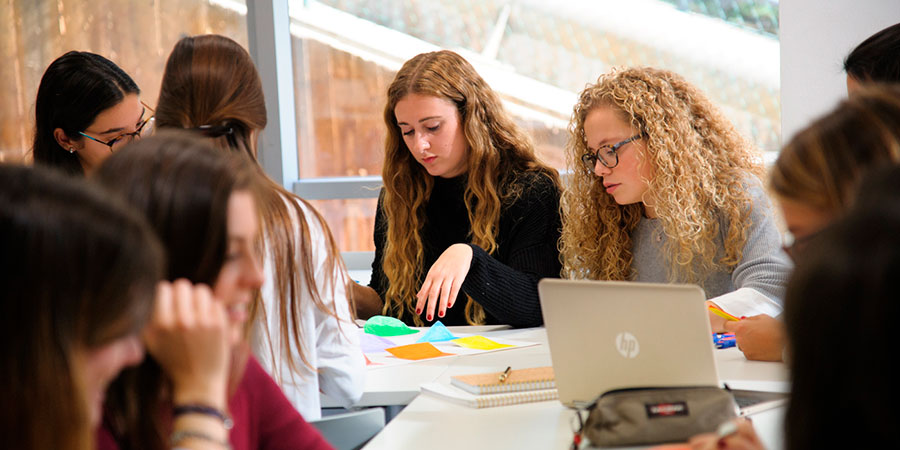
70% of credits in English
Degrees taught in Catalan, Spanish and 70% in English. The minimum level required to access the Degree is B2, which will become a C1 at the end of your university studies.
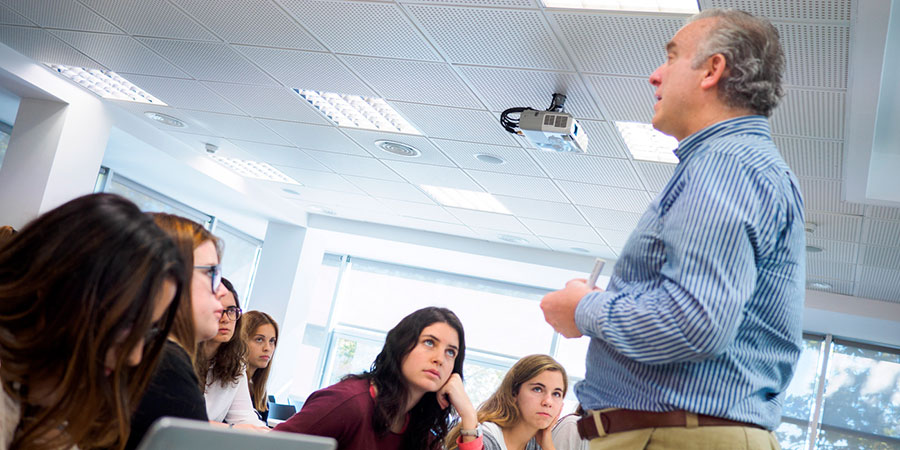
Native English lecturers
Study with native English expert lecturers

Practice agreements with foreign schools
Make the most of the agreements with institutions in Finland, Germany, United States, France and Argentina, among others.
Prepare for more career opportunities
Thanks to your good level of English, and that this degree is official throughout the European Union, you will be able to work abroad. Also, you will have access to endless career opportunities, both within and outside of education. You will have access to:
- Editorials
- Resource centres
- Leisure activities
- Museum education departments
- Non-formal education centres
Students tell you their experience
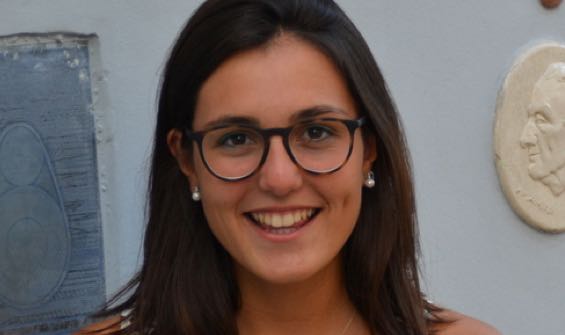
“Thanks to the variety of agreements that the faculty has with different countries, in January I will be going to a school in London to do my last internship.”
Carla Vidal
Primary Education Degree student
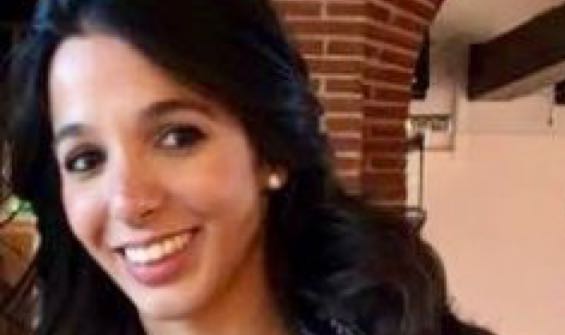
"As well as excellent academic education and the selection of internships, UIC Barcelona boasts lecturers who are pedagogically involved, that create a family environment that helps you to grow both personally and professionally."
Patricia Gassó de Broto
Pre-Primary Education Bilingual Degree student
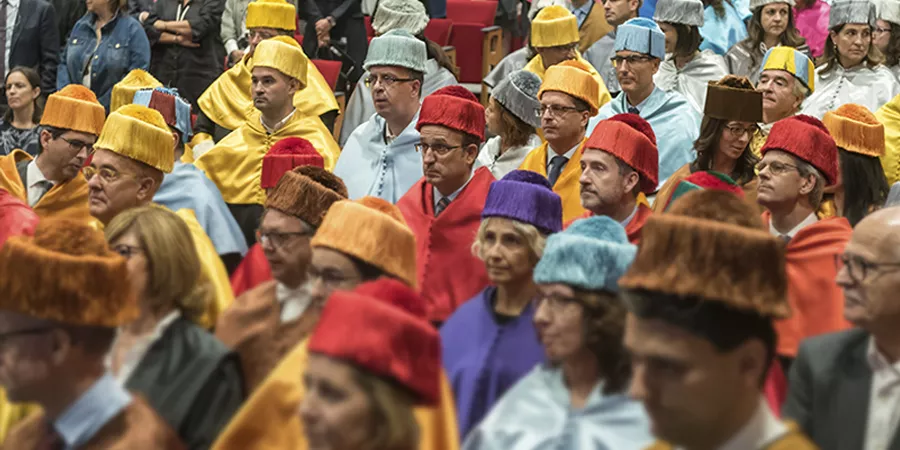
Professors and lecturers who make good teachers
The teaching team in the Faculty of Education consists of professionals who train future teachers using the most innovative methodologies. They are also involved in important research activities both inside and outside the university. Direct contact with professional practice allows our professors and lecturers to transmit a comprehensive, multidisciplinary and human overview of the reality in the sector to students.
Study abroad

With this degree, you can study part of the curriculum or do your internship abroad, with academic recognition. Participate during one semester or year at one of your faculty's partner universities, or search for a business abroad for your internship. You can also get part of your ECTS during the summer at the Berkeley Summer Sessions, the best public university in the world.

Practice the theory you have learnt
Presentation
Objectives
We teach you based on objectives. The Bachelor's Degree will provide:
- A sound command of all applicable course content. Always from a global perspective.
- Techniques to ensure peaceful co-existence in the classroom through emotional education and autonomy. Promotion of effort, constancy and discipline.
- Knowledge of how language develops in a multicultural and multilingual environment.
- Out-of-classroom skills relating to school organisation, tutoring sessions for parents or your relationship with other education agents. Preparation for the demands of today's society.
- Sensitivity to diversity and gender equality. Respect for human rights and civic values.
- The ability to introduce students to the digital world and add cultural richness through new pedagogical possibilities.
- Valuing cooperative work, a critical spirit and responsibility in relation to a sustainable future.
Competences of graduates
Your competences are what set you apart as a teacher who is useful to society.
Cross-disciplinary competences
Mastery of information technology and communication, languages (Catalan, Spanish, English), developed critical thinking and reflective analysis, the ability to be creative.
Teacher-specific competences
Expertise in the subjects you teach and the teaching methods you employ, ability to work with colleagues and other staff members, professional development.
Subject-specific competences
Competences you will develop through a number of diverse methods such as lectures, case studies, problem solving and problem-based, project-oriented, cooperative and independent learning.
At UIC Barcelona we will assess your competences through: objective exams, assignments and projects, portfolios, reports, self-evaluation, interviews, etc.
Academic accreditation
Bachelor's Degree in Pre-Primary Education or in Primary Education.
Academic structure
Bachelor's Degree in Pre-School Education
First year
First semester
- Psychology I: Bases of Psychology Development
- Sociology of Education
- English Language I
Second semester
- Psychology II: Cognitive Processes
- English Language I
Second year
First semester
- English Language II
- Family Sociology
- Music, Plastic and Physical Expression I
Second semester
- Psychology III: Learning Disorders
- School Work Placement I
Third year
First semester
- Nature Sciences, Social Sciences and Mathematics I
- Nature Sciences, Social Sciences and Mathematics II
- Languages and Literacy III
- School Work Placement II
Second semester
- Learning a Foreign Language: English
- Music, Plastic and Physical Expression III
- School Intership II
Fourth year
First semester
- Instrumental English
- English Language Teaching I
- English Language Teaching II
- English Language and Culture
- Content and Language Integrated Learning
Second semester
- School Intership III
- Final Degree Project
Bachelor's Degree in Primary Education
First year
First semester
- Psychology I: Bases of Psychology Development
- Sociology of Education
- English Language I
Second semester
- Psychology II: Cognitive Processes
- English Language I
Second year
First semester
- English Language II
- Family Sociology
- Mathematics I
- Learning and Teaching Music and the Plastic and Visual Arts I
Second semester
- Psychology III: Learning Disorders
- Experimental Sciences II
- Mathematics II
- School Intership I
Third year
First semester
- Experimental Sciencies III
- Language Teaching III
- School Intership II
Second semester
- Social Sciences II
- Learning a Foreign Language: English
- Learning and Teaching Music and the Plastic and Visuals II
Fourth year
First year
- Instrumental English
- English Language Teaching I
- English Language Teaching II
- English Language and Culture
- Content and Language Integrated Learning
Second year
- School Intership III
- Final Degree Project
Teachers
- AGUIRRE ARTEAGA, Georgina
- AGUSTIN BRETOS, Susana
- ALBAREDA TIANA, Sílvia
- AMORES BARGAY, Joan
- BALAGUER FÀBREGAS, Maria Carmen
- BALCELLS SANAHUJA, Meritxell
- BONET PEROT, Ariadna
- BOSCH RABELL, Magdalena
- CABALLERO RIVAS, Cristina
- CAMPAMÀ TUBAU, Joan
- CAMPS BANSELL, Jaime
- CARBALLO MARQUEZ, Anna
- CARR MILIO, Tomas Joaquin
- CIBORRO ROJO, Núria
- CREUS JORQUERA, Ingrid
- DE BOFARULL DE TORRENTS, Ignacio
- DÍAZ HEVIA, Pablo
- DOMINGO COSCOLLOLA, Maria
- DOMÍNGUEZ BERNÚS, Alejandro
- ESTRADA BASCUÑANA, Carolina
- FERNÁNDEZ ELORDUY, Ainhoa
- FUERTES CAMACHO, Maria Teresa
- GONZÁLEZ MANCEBO, Sheila
- GRAELL MARTIN, Mariona
- GRAU GRAU, Marc
- GUTIÉRREZ SIERRA, Andreu
- HOWES, Christina Angela
- INSENSER MORENO, Maria
- JIMÉNEZ LÓPEZ, Esther
- LUNA BROSA, Maria Cristina
- MARTÍN GASCON, Beatriz
- MARTORELL SABATÉ, Eduard
- MASVIDAL ROQUET-JALMAR, Nuria Maria
- MEHRAD, Aida
- MONFORTE, Pierre Jérome
- NAVARRO GIL, Noelia
- OLIVA MARTÍNEZ, Francisco-Javier
- PASCUAL SÁNCHEZ, Joel
- PERETA SIMÓN, Elena
- PONS MUDARRA, Cristina
- PORTELL RIFÀ, Joan
- PUIG VOLTAS, Jordi
- PUJOL VALLS, Maria
- RODRÍGUEZ PRAT, Andrea Mercedes
- ROIG MARZÁ, Alberto
- ROMERO VELASCO, Margarita
- ROQUET PUGÈS, Helena
- SÁNCHEZ CAMACHO, Rafael
- SCOTT, Yolanda Isabel
- SEGURA RODRÍGUEZ, Cristina
- SERRA ORDOÑEZ, Montserrat
- TUSET MATEU, Mª Teresa
- VASYLETS, Olena
- VERDERA ALBIÑANA, Asunción
- VIDAL FLURIACH, Carla
- VIDAL RODÀ, Enric
- AGUIRRE ARTEAGA, Georgina
- ALBAREDA TIANA, Sílvia
- AMORES BARGAY, Joan
- ARÉVALO SAINZ, Raquel
- BALAGUER FÀBREGAS, Maria Carmen
- BALCELLS SANAHUJA, Meritxell
- BOSCH RABELL, Magdalena
- CAMPS BANSELL, Jaime
- CARBALLO MARQUEZ, Anna
- CARRERAS PARERA, Joaquim
- CARR MILIO, Tomas Joaquin
- CREUS JORQUERA, Ingrid
- DE BOFARULL DE TORRENTS, Ignacio
- DOMINGO COSCOLLOLA, Maria
- ESTRADA BASCUÑANA, Carolina
- EVNITSKAYA, Natalia
- FERNÁNDEZ MORILLA, Mónica
- FUERTES CAMACHO, Maria Teresa
- GONZÁLEZ MANCEBO, Sheila
- GOTSENS BELLART, Mª Teresa
- GRAELL MARTIN, Mariona
- GRAU GRAU, Marc
- GUTIÉRREZ SIERRA, Andreu
- HOWES, Christina Angela
- INSENSER MORENO, Maria
- JIMÉNEZ LÓPEZ, Esther
- LÓPEZ CARNEROS, Maria José
- LUNA BROSA, Maria Cristina
- MARTORELL SABATÉ, Eduard
- MASVIDAL ROQUET-JALMAR, Nuria Maria
- MEHRAD, Aida
- NAVARRO GIL, Noelia
- OLIVA MARTÍNEZ, Francisco-Javier
- PERETA SIMÓN, Elena
- PÉREZ NICOLAU, Meritxell
- PONS MUDARRA, Cristina
- PORTELL RIFÀ, Joan
- PUIG VOLTAS, Jordi
- PUJOL VALLS, Maria
- REY PEÑA, Beatriz Paloma
- RODRÍGUEZ PRAT, Andrea Mercedes
- ROIG MARZÁ, Alberto
- ROQUET PUGÈS, Helena
- SÁNCHEZ CAMACHO, Rafael
- SCOTT, Yolanda Isabel
- SERRA ORDOÑEZ, Montserrat
- VASYLETS, Olena
- VERDERA ALBIÑANA, Asunción
- VIDAL RODÀ, Enric
Internship
The institutions in which the work experience can be carried out will either be state owned, partially state owned or private.
In the two former cases, the centers must be accredited by the Departament d'Ensenyament of the Generalitat de Catalunya.
In the third case agreements for bilateral collaboration are made between universities and institutions in Catalonia, outside Catalonia, and abroad.
Objectives
The main objective of this work experience is for students to develop the necessary skills so that they are able to establish a relationship between theory and practice. In order to achieve this it is necessary for the student to be able to observe and carry out a descriptive and interpretative analysis of contexts, be able to intervene, first with guidance and then independently and also be able to make proposals and / or develop projects tailored to the needs of the real context of work experience.
Operation
External work experience is educational in nature and forms part of the compulsory practicum module.
The practicum module includes the following subjects:
- Work Experience in Schools I
- Work Experience in Schools II
- Work Experience in Schools III
Regulations
External work placements are regulated by legal rules and external regulations. The legal rules are based on signing a preliminary agreement which establishes the agreements and commitments entered into by the institutions, universities and the work experience students. Insurance is covered by the enrolment fees.
The internal regulations set out the guidelines to be followed in each of the external work placements and define the tasks for the tutors in the centres, for universities and for the students on a placement. The teacher's guides for each subject contain details of these regulations.
Professional opportunities
Those who complete the programme and gain the corresponding degree are qualified to begin professional careers as teachers.
The degree certificate allows graduates to organize activities in both public and private schools.
Graduates may also choose to work in the following areas:
- Publishing houses
- Resource centres
- After-school facilities and recreational clubs
- Educational teams in museums or non-formal educational activities
Prerequisites & admissions
PAP Test
From the 2024-2025 academic year onwards, the Personal Aptitude Tests (PAP), organised and externally evaluated by the Interuniversity Council of Catalonia (CIC), will have to be passed before admission to the bachelor’s degree, or during the first year of the studies.
The Faculty of Education Sciences offers a PAP online preparatory course.
Application for admissions
To pre-register for undergraduate studies at UIC Barcelona, you will need to complete the application form available via the following link:
Entrance Examinations
The entrance exam is held several times throughout the year on Campus Barcelona. To take the exam, you must first complete the application for admission.
For more information:
Required documentation
The documentation required for the admission process varies according to each candidate’s academic background. Click on the following link to see what documents you will need to provide
Reservation and enrolment
In order to reserve a place on the programme, admitted candidates must pay 20% of the fee for the first year upon receipt of their letter of acceptance.
The remaining 80% is due after enrolment.
For more information:
Acces vias
Programme applicants may come to UIC Barcelona from different academic backgrounds. Click on the following link for detailed information on the route most pertinent to you:
Grants & financial aid
Grants
UIC Barcelona offers various fellowships supported by both public institutes (MEC or AGUAR) as well as private UIC Barcelona funds.
For further information, please check with our admissions department:
Financial aid
Each payment method is adhered to the specific financing conditions of each degree programme.
Please see the attached document for details on these conditions:
Discounts
Those seeking undergraduate degrees at UIC Barcelona may be eligible for different discounts depending on their circumstances.
Faqs
General information
How many places are available at the Faculty of Education?
There are 80 places available across our degree programmes in Education and 90 places on our bachelor’s degrees in primary Education. The places are divided into smaller groups depending on the subject. The new double degrees in Pre-Primary Education with Psychology and in Primary Education with Psychology, offer a total of 10 places.
How much does a bachelor’s degree in education cost?
The price depends on the degree programme. You can check the cost of credits at uic.es/educación
Do students need to buy books or any other additional materials for classes?
No, all teaching material is available on the University’s digital platform and at the Library. There are no elevated costs associated with the material.
What kind of grants or funding can I get to study education at UIC Barcelona?
You can check our website for all options regarding grants, discounts or free enrol- ment, as well as funding conditions. If you have an average mark of 8 from your first year of upper secondary school, or a 9 from your first year of CFGS, you can apply for an Academic Excellence Grant. (uic.es/becas).
When will exams be held?
From 3 to 5.30 p.m. approximately.
How and where are the exams held?
To ensure candidates’ safety, we have decided to hold all entrance exams online. Before the exam, we will send you all the information you need to access it (how to log in, your username, password, timetables, etc.)
When do the work placements begin?
Students start classroom work placements from their first year. External work placements in education begin in the second year, three weeks in alternation. During the third year they last six weeks, and in the fourth year, three months.
Access routes
Can I apply for the entrance examinations with any upper secondary school qualification?
Yes, you can apply from any type of upper secondary school qualification.
Can I apply to sit the entrance examinations from any higher level vocational training course (CFGS)?
Yes. And in addition, depending on the CFGS, students can have up to 30 ECTS credits officially recognised.
If I have already completed a bachelor’s degree, do I have to take the entrance exams?
Yes, everyone has to take the entrance exams.
Can any of my subjects be officially recognised if I have already started university studies?
Yes, you can request that your subjects be officially recognised, especially if your previous degree programme was in the same field of knowledge: Social Sciences.
Entrance exams and the admission process
What is the cut-off mark for accessing a degree programme in education?
Your admission will depend on the outcome of our University’s entrance exams, in addition to passing the PAU (national Spanish university entrance examinations) and the PAPs (personal aptitude test).
What do the entrance exams involve?
They involve: a psycho-technical test, an English test, a specific Spanish and Catalan language test, a general culture test and a one-to-one interview. All of these tests are sat the same day.
Can I look up past entrance exam papers?
We do not provide past papers from previous years’ exams. In the case of the specific tests, we suggest that you revise one or more first-year upper secondary school text books. And for the psycho-technical test, you can find examples on the internet that give you an idea of the style of the exam.
Is the examination multiple choice?
Yes. Any incorrect answers will not be deducted from your total score. Only those candidates applying for an Academic Excellence Grant will sit another written exam.
What level of English is required for the exam?
You do not need to have a minimum level of English to access the bachelor’s degrees in education, we only request a minimum B2 level in the case of bilingual subjects on bachelor’s degrees and double degrees.
How are the marks from both my academic record and the entrance examinations weighted?
5% is attributed to your academic transcript, 25% to the entrance exams and 10%, to the one-to-one interview.
Can I choose the date of the entrance exam?
You can request a specific date, but you must wait for a notification from the
Admissions Department who, after reviewing your documentation will confirm the date of your test via email. The number of places will decrease as the exam sittings take place. In general, we recommend attending the first calls. You can see the entrance exams dates by visiting: uic.es/ca/admissions/graus/ proves-admissio
When will I find out the results of the entrance exams?
The results will be sent via email approximately 15 working days after the exams have been taken.
If I am ‘not admitted’ can I attend the following call during the same academic year?
No, you can only attend one call per academic year.
If I am admitted, what is the next step?
You will receive a letter of admission containing information about the next steps to take in order to reserve your place which means paying 20% of the fee for the first year. You will pay the remaining 80% during the enrolment period, between July and September.
If I choose not to study at UIC Barcelona after having reserved a place, will the reservation fee be refunded to me?
The reservation fee will only be refunded if you do not pass upper secondary school or pass the PAPs. This clause is laid out in our General Terms and Conditions.
Do I have to pass the PAPs to be able to access a bachelor’s degree in education at UIC Barcelona?
The PAP tests are not an admission requirement for non-profit private universities, but they are part of an agreement to improve the profile of future teachers. If you have not passed the test before beginning your studies at the Faculty, you must do so during your first year.
International mobility
Study abroad temporarly
As a student in this degree programme, you may complete part of your degree or a work experience placement abroad and receive academic recognition.
Spend a semester or a full academic year at one of your Faculty’s partner universities or find a company abroad to do an internship. You may also:
- Attend the Berkeley Summer Sessions (extracurricular activity) the world’s best public university.
For information about everything you need to do before, during and after your mobility stay, check out the "Study abroad" section and download all the documentation specific to your Faculty:
Study with us
If you are studying at another Spanish or foreign university, you can come to UIC Barcelona to study temporarily for one semester or a full academic year.
Visit the “International exchange students site” for more information and, download here all the specific documentation of this faculty:
